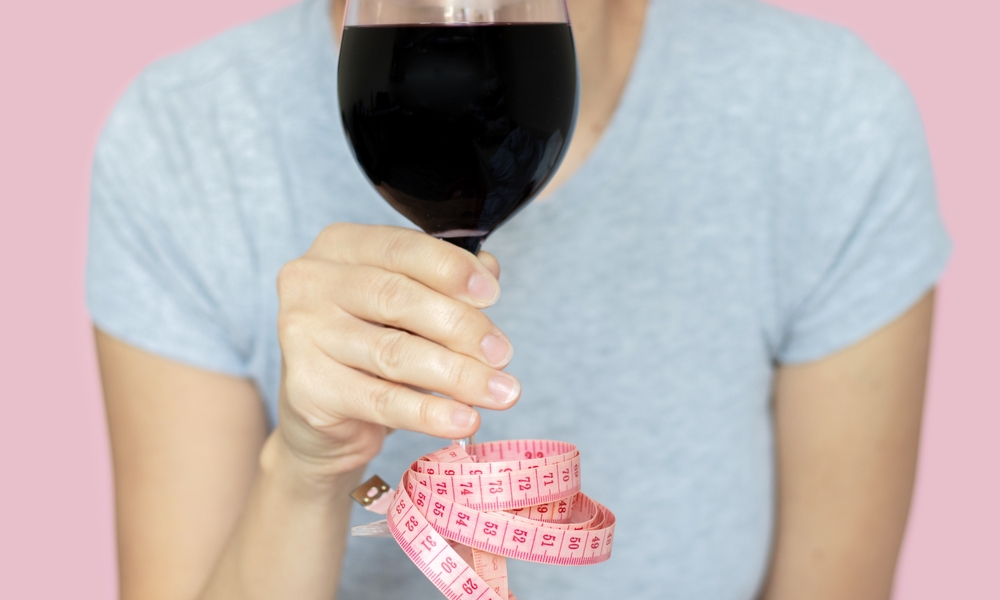DISCLAIMER: Always consult with a healthcare professional before starting new routines, programs, or nutrition plans to ensure you receive the best medical advice and strategy for your specific needs.
If you want to keep your weight in check, you may already be scrutinizing your diet to assess whether it aligns with your nutritional objectives. The sneaky delectable treats provide little to no nutritional value. The processed snacks tantalize your palate but lead you down a road of unfulfilled cravings. The greasy fries make your taste buds sing while your arteries screech in agony. You already know which foods to banish, and a healthier you is worth the sacrifice.
However, not just processed foods can derail your weight management goals.
Alcohol can be a factor, too, whether it be the frothy brews savored at a seasonal barbeque, or the bottle of wine uncorked at a convivial dinner with a companion. Packed with carbs, sugar, and empty calories, alcohol can contribute to weight gain, especially when consumed in excess.
On top of that, throwing back a few drinks can make it all too easy to say yes to that extra slice of pizza. Or the late-night run to the taco truck may suddenly seem like a brilliant idea. It’s no secret that alcohol can impair judgment, leading to some questionable food decisions.
So, if you are trying to stay fit and healthy, it’s worth looking at your alcohol consumption. While it’s not the only factor at play, alcohol can be a troublemaker. It is one of the major culprits that can impact your weight, and there are a few things you should keep in mind when it comes to alcohol and your body composition.
High-Calorie Content
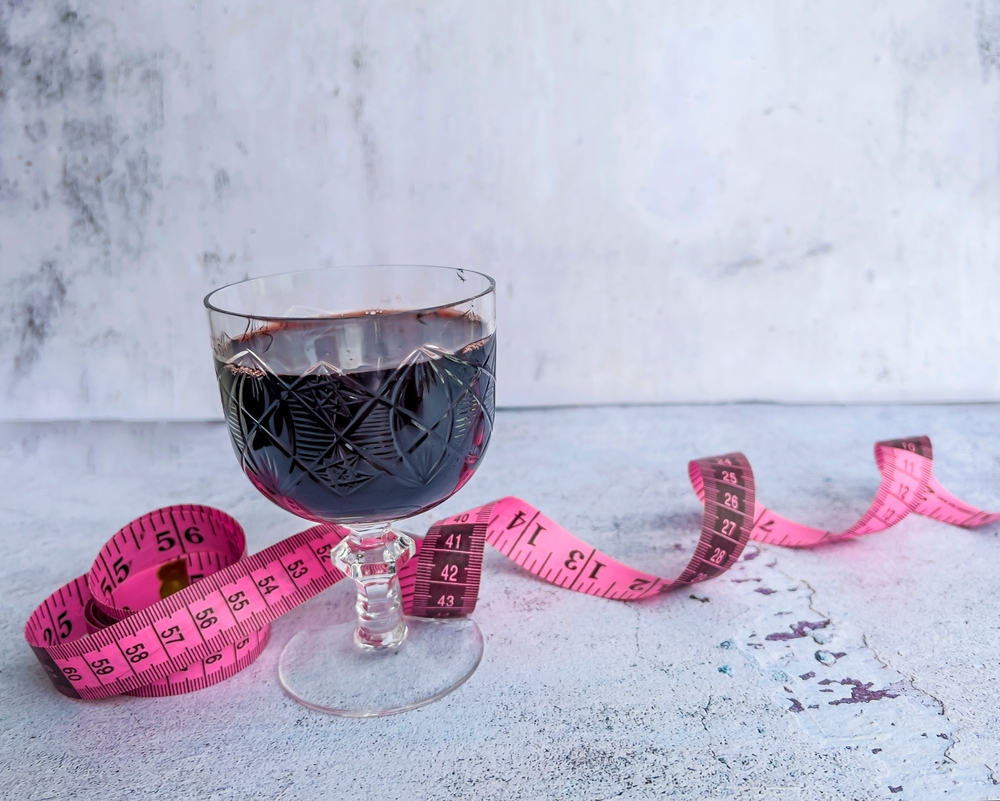
The issue with alcohol is that it’s sneaky, sneaky. Drinks are often chock-full of calories and sugar, which can add up fast without us realizing it. A standard 12-ounce beer, for example, contains about 150 calories, which is roughly equivalent to a small serving of French fries.
A standard 5-ounce glass of wine has 125 calories which is comparable to a small scoop of ice cream. And sugary cocktails are notorious for their high-calorie content, with margaritas and pina coladas containing as much as 200 to 300 calories per serving. To put this into perspective, that’s the same amount as a cheeseburger or a slice of pizza.
All of these drinks – beer, wine, and cocktails – are culprits of hiding extra calories, and consuming them can increase your overall intake. This can make it challenging to create a calorie deficit, which is like the holy grail of weight loss.
Moreover, when you down a drink or two, your body goes into overdrive to metabolize alcohol, which means it isn’t burning fat as it should be.
Let’s examine how alcohol sabotages your goal of reaching and keeping a healthy weight.
Reduced Metabolism
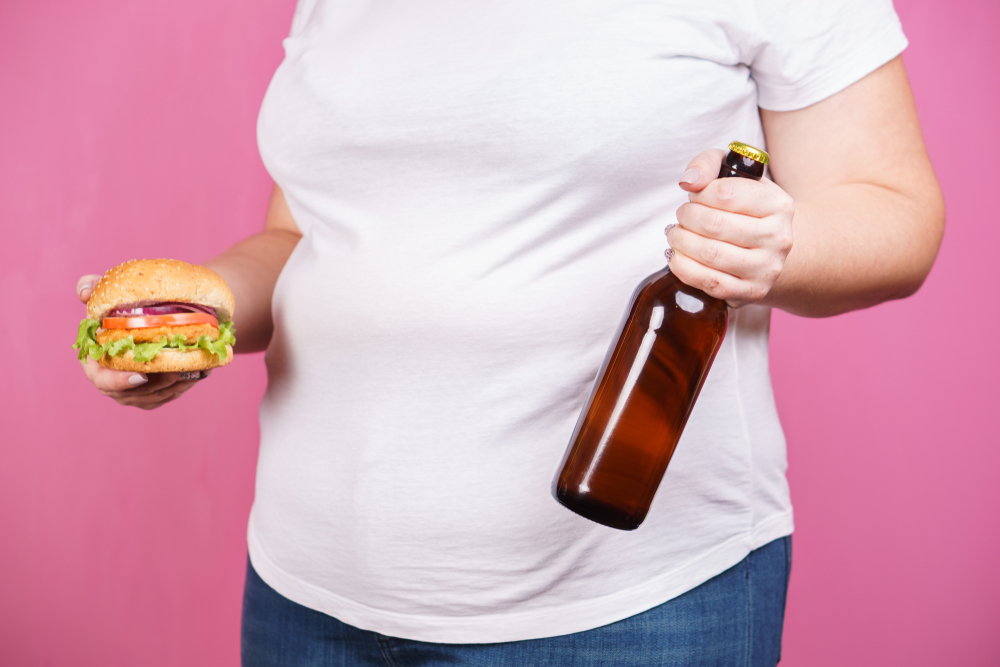 As your liver prioritizes processing alcohol and removing it from your body, it is temporarily unable to break down carbohydrates and fats. This leads to a decrease in the number of calories your body burns, causing a reduction in your metabolic rate.
As your liver prioritizes processing alcohol and removing it from your body, it is temporarily unable to break down carbohydrates and fats. This leads to a decrease in the number of calories your body burns, causing a reduction in your metabolic rate.
While drinking a glass of beer or wine with dinner is unlikely to affect your weight loss goals, regularly consuming large amounts can seriously impede your progress.
Plus, excessive alcohol consumption can lead to inflammation and dehydration, causing further deceleration of your metabolic rate. When you are dehydrated, the body can’t burn calories efficiently, which causes your metabolism to become more sluggish.
In addition, alcohol can cause inflammation by disrupting the balance of your gut microbiome. This imbalance can lead to an overgrowth of harmful bacteria and digestive system inflammation. When inflammation becomes chronic, it can interfere with the body’s ability to metabolize fatty acids and glucose, causing insulin resistance and weight gain.
Increased Appetite
 Alcohol slows down metabolism and can lead to cravings for unhealthy foods. You know those times when you swear you’re only going to have a beer or two and end up eating an entire pizza?
Alcohol slows down metabolism and can lead to cravings for unhealthy foods. You know those times when you swear you’re only going to have a beer or two and end up eating an entire pizza?
Blame it on alcohol which can trigger appetite in a few ways. For one, it can interfere with hormones like ghrelin and leptin, which control appetite, disrupting hunger and fullness signals.
Impaired Decision-Making
 Alcohol is known to impair decision-making and reduce inhibitions, making it more likely to give in to unhealthy food choices. When you consume alcohol, it affects the prefrontal cortex of your brain, which is responsible for self-control and decision-making. This can cause a decrease in your ability to make sound decisions, leading to unwholesome food selections.
Alcohol is known to impair decision-making and reduce inhibitions, making it more likely to give in to unhealthy food choices. When you consume alcohol, it affects the prefrontal cortex of your brain, which is responsible for self-control and decision-making. This can cause a decrease in your ability to make sound decisions, leading to unwholesome food selections.
Moreover, alcohol lowers inhibitions and makes it easier to give in to cravings for unhealthy foods without thinking about the consequences. So, after a few drinks, resisting the temptation to eat a whole pizza becomes more difficult, even if you normally have the willpower to say no. The reason is that alcohol can lower your ability to consider the long-term effects of your actions, causing you to become more focused on immediate gratification.
Disrupted Sleep
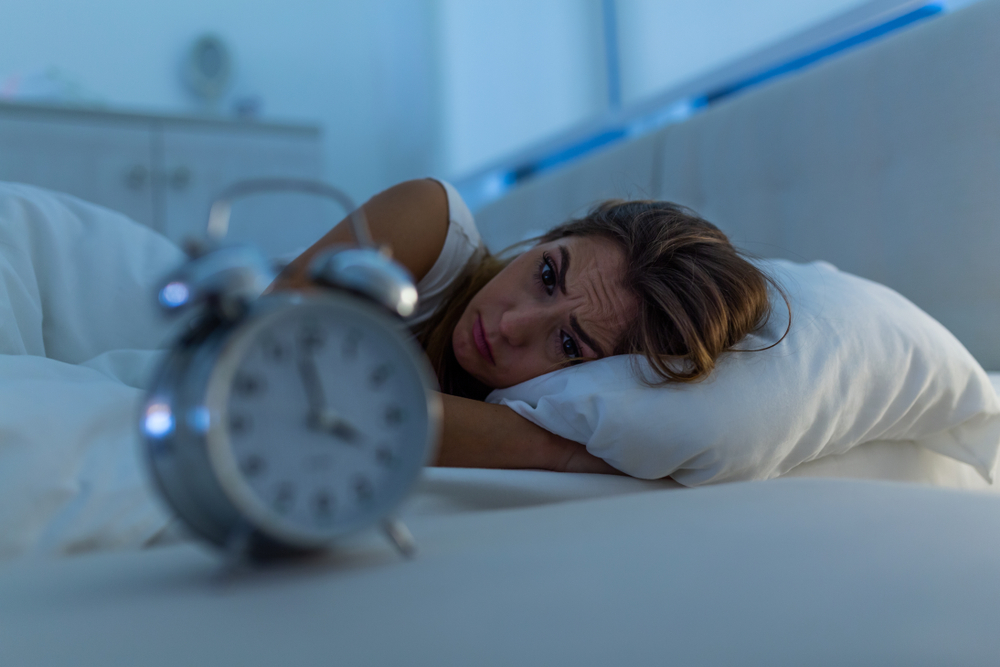 Alcohol can disrupt your sleep by interfering with your body’s ability to regulate metabolism and hunger. When you are sleep-deprived, your body produces less leptin and more ghrelin, the two hormones that regulate satiety and hunger.
Alcohol can disrupt your sleep by interfering with your body’s ability to regulate metabolism and hunger. When you are sleep-deprived, your body produces less leptin and more ghrelin, the two hormones that regulate satiety and hunger.
When you experience insufficient sleep, the increase in ghrelin production signals hunger to your brain, resulting in amplified food cravings and appetite. Over time, this can lead to overeating, a higher calorie intake, and weight gain.
At normal levels, leptin tells your brain to increase energy expenditure and suppress appetite when you are full. Yet, insufficient sleep can lead to low leptin levels, resulting in uncontrolled hunger and an increased likelihood of overeating.
In addition to hunger and satiety, sleep plays a key role in metabolic health. A shortage of sleep can affect your body’s glucose management mechanism, leading to a cascade of unfavorable health scenarios, one of which is an unwelcome increase in body weight.
Lastly, insufficient sleep can disrupt the body’s circadian rhythms and cause a disturbance in metabolism, leading to an imbalance between the energy we consume and burn. This mismatch can result in the body hoarding surplus energy in the form of fat, leading to weight gain and potential obesity.
Liver Function
 The liver is like the superhero of your body. It is always working hard, eliminating toxins, and helping to keep your body on an even keel. When you happen to drink more than usual, however, you are causing a bit of chaos there. Your liver has to work overtime to metabolize alcohol, which is essentially a toxin.
The liver is like the superhero of your body. It is always working hard, eliminating toxins, and helping to keep your body on an even keel. When you happen to drink more than usual, however, you are causing a bit of chaos there. Your liver has to work overtime to metabolize alcohol, which is essentially a toxin.
So, when your liver is busy dealing with alcohol, it isn’t doing its usual work on tackling other toxins. These could be anything, from the pizza you had for dinner to the pollution you breathe in on your commute. And some of these toxins can actually contribute to weight gain. The air you breathe, for example, contains pollutants from power plants, factories, and cars. These particles can cause oxidative stress and inflammation, affecting your metabolism.
Apart from being a detox machine, the liver plays a big part in digestion and the metabolism of vitamins. It produces bile which is crucial for breaking down fats so they can be digested more easily.
But if your liver isn’t working at its best, it can negatively impact fat digestion and the absorption of essential fat-soluble vitamins such as A, D, and E. This can lead to nutrient deficiencies, which can make it harder for you to lose weight. Vitamin D deficiency, for example, has been linked to overweight and obesity, irrespective of other factors.
In addition to vitamins and other micronutrients, your liver metabolizes macronutrients such as protein, fat, and carbs. The liver is in charge of converting them into forms that your body can use for energy or store for later use.
As you consume fats and proteins, for example, your liver works to convert them into usable energy or saves them for later. If the liver is busy with alcohol, these functions can become compromised. So, instead of transforming these nutrients into energy or storing them appropriately, they could linger in your bloodstream and become unwanted fat deposits.
Heart Function
 Alcohol has been linked to an increased risk for cardiovascular disease, especially at higher consumption levels.
Alcohol has been linked to an increased risk for cardiovascular disease, especially at higher consumption levels.
First, alcohol can cause hypertension which damages the heart’s blood vessels.
Second, prolonged drinking can lead to abnormal heartbeat, thus contributing to the development of heart disease. Physical activity can become more challenging when the heart is compromised due to alcohol-related damage. As exercise is a crucial aspect of weight loss, alcohol can negatively impact your weight management efforts.
Exercise Performance
 Alcohol can impact your energy levels and recovery, making it harder to stick to your exercise routine. Alcohol may initially give you a quick pick-me-up or a feeling of calm, but those sensations dissipate before long. What comes next is often a wave of tiredness and lethargy. This happens because alcohol acts as a depressant, leading to a slowdown in bodily responses and brain activity.
Alcohol can impact your energy levels and recovery, making it harder to stick to your exercise routine. Alcohol may initially give you a quick pick-me-up or a feeling of calm, but those sensations dissipate before long. What comes next is often a wave of tiredness and lethargy. This happens because alcohol acts as a depressant, leading to a slowdown in bodily responses and brain activity.
To make a point, consider a scenario where you consumed a few drinks last night and are trying to get up for an early morning workout. You are battling low energy, possibly nursing a headache, and grappling with poor coordination and focus. It is not exactly the optimal condition for a productive workout, and instead of hitting personal bests, you may struggle with the basics.
In the long run, this could lead to less progress in your fitness goals and potential weight gain.
Inhibits Muscle Growth
 When you’ve just finished an intense workout, your muscles have put in the work and are ready for repair and recovery. It’s like your muscles are hosting a mini restoration bash where the VIPs include protein and a good night’s sleep.
When you’ve just finished an intense workout, your muscles have put in the work and are ready for repair and recovery. It’s like your muscles are hosting a mini restoration bash where the VIPs include protein and a good night’s sleep.
Alcohol is not welcome at this gathering as it can be a bit of a party crasher regarding muscle recovery. It’s like that one person who shows up uninvited, eats all the snacks, and starts a karaoke session when everyone else is trying to chat.
One of the ways alcohol does this is by interfering with your sleep. Even though it might make you feel drowsy, alcohol can prevent you from reaching the deeper stages of sleep, where muscle repair and growth happens. So, even if you clock in a solid 8 hours, your sleep might not be as restful or restorative as it should be.
On top of this, alcohol can interfere with protein synthesis, which is responsible for building new proteins. Since they are the building blocks of muscle, this interference can slow down muscle growth.
As alcohol can impede muscle growth, making reaching your weight loss goals more difficult. This is because the more muscle you have, the more calories you burn throughout the day, even when you’re not exercising. So, if alcohol gets in the way of muscle growth, it can lead to fewer calories burned overall, making weight loss more challenging.
Impairs Magnesium Absorption

Magnesium is a critical mineral that regulates metabolism, promotes weight loss, and maintains healthy blood sugar levels. Consuming alcohol can lead to increased excretion of magnesium through the kidneys, thus interfering with the body’s ability to absorb it effectively.
This disruption can cause various side effects, including reduced energy levels, impaired insulin sensitivity, and a decrease in the body’s ability to burn fat, all contributing to weight gain.
Increases Cortisol Levels
 Drinking alcohol can increase cortisol levels, which may have a role in weight gain. Known as the stress hormone, cortisol is produced in response to various stressors, including alcohol consumption. At elevated levels, this hormone is associated with a decline in metabolism and an increase in appetite, both of which can lead to weight gain, particularly in the abdominal area.
Drinking alcohol can increase cortisol levels, which may have a role in weight gain. Known as the stress hormone, cortisol is produced in response to various stressors, including alcohol consumption. At elevated levels, this hormone is associated with a decline in metabolism and an increase in appetite, both of which can lead to weight gain, particularly in the abdominal area.
Furthermore, research suggests prolonged alcohol consumption can result in elevated cortisol levels, persisting even during periods of abstinence or low alcohol intake. Frequent drinking can lead to sustained high cortisol levels, exacerbating weight gain and other health complications linked with heightened levels.
Testosterone & Estrogen Imbalances
 Testosterone is an essential hormone that plays a role in maintaining optimal body composition, muscle mass, and bone density. By increasing cortisol levels in the body, alcohol can reduce testosterone, ultimately resulting in a loss of muscle mass and an increase in body fat.
Testosterone is an essential hormone that plays a role in maintaining optimal body composition, muscle mass, and bone density. By increasing cortisol levels in the body, alcohol can reduce testosterone, ultimately resulting in a loss of muscle mass and an increase in body fat.
Furthermore, alcohol can cause an increase in estrogen levels, a hormone that is typically associated with women but is also present in men. Elevated estrogen levels can lead to a decrease in testosterone production and affect body composition in a negative way. In addition, elevated estrogen levels can inhibit the breakdown of fat and thus contribute to weight gain.
Weight Loss Medications
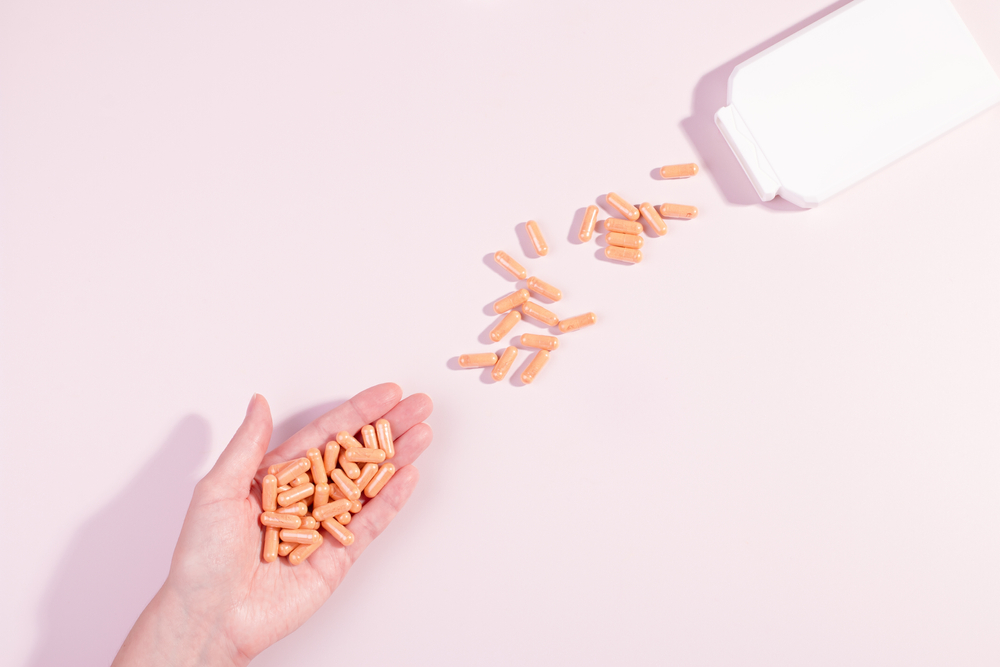 Losing weight can be challenging, which is why many turn to medications that are specifically designed to aid the process. These medications block fat absorption, increase metabolism, and suppress appetite. While they can be effective, combining them with alcohol can lead to unwanted side effects.
Losing weight can be challenging, which is why many turn to medications that are specifically designed to aid the process. These medications block fat absorption, increase metabolism, and suppress appetite. While they can be effective, combining them with alcohol can lead to unwanted side effects.
As alcohol can affect the way the liver metabolizes medications, this could result in а lower efficacy or increased side effects. Some medications can cause drowsiness, dizziness, or impaired judgment, and alcohol can amplify these effects, making it unsafe to perform activities that require mental alertness.
Furthermore, drinking alcohol can increase the production of certain enzymes in the liver, including cytochrome P450, which can speed up the breakdown of medications. As a result, they may be eliminated from the body too quickly, leading to а decreased efficacy.
Other Factors that Contribute to Weight Gain
 Aside from alcohol consumption, many factors can cause weight gain, including age, genetics, medications, and lack of physical activity.
Aside from alcohol consumption, many factors can cause weight gain, including age, genetics, medications, and lack of physical activity.
Genetics plays a significant role in your susceptibility to weight gain. Some genetic variations affect appetite control, hormone regulation, and metabolism and make it more difficult to maintain a healthy weight. Age is also a factor that can contribute to weight gain. As people age, metabolism tends to slow down, and the body becomes less efficient in burning calories.
Furthermore, older people are more likely to become less physically active for various reasons, including health conditions, injuries, and a sedentary lifestyle. This decrease in physical activity can lead to a decline in muscle mass and strength, negatively impacting metabolism and contributing to weight gain.
Certain medications, such as antidepressants, antipsychotics, corticosteroids, and insulin, can also lead to weight gain. These medications can increase appetite, decrease metabolism, and cause fluid retention.
Lastly, a lack of physical activity can significantly impact the number of calories you burn, making it more difficult to lose weight. And the combination of both, lack of physical activity and medications, can cause significant weight gain. In some cases, the medication increases appetite and decreases energy levels, making it more difficult to engage in physical activity.
Wrapping Up
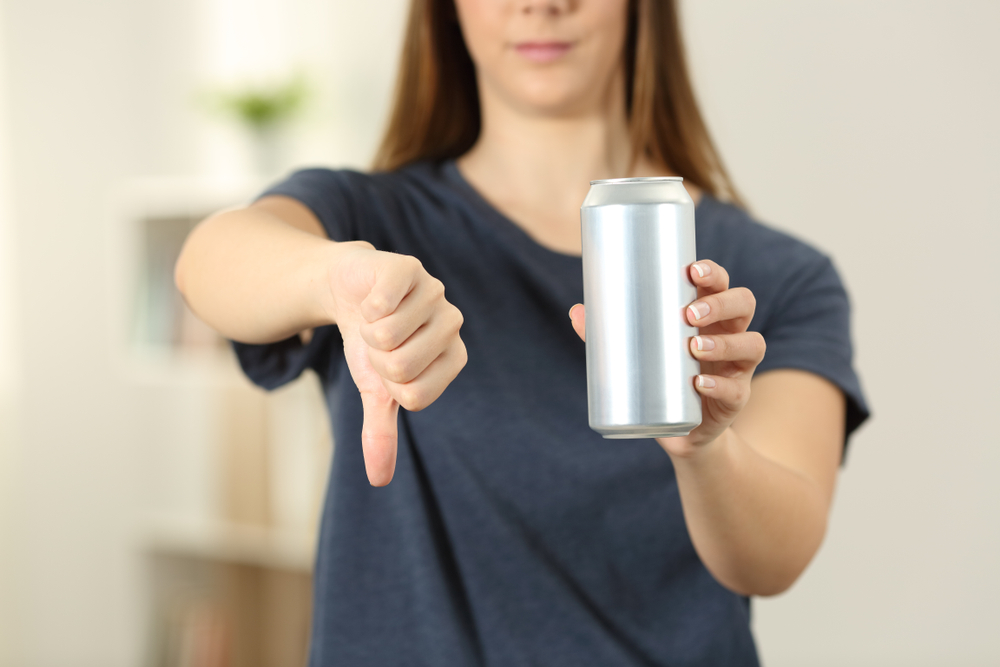 Maintaining a healthy weight is no easy feat. While eating right and staying active are obvious steps, your happy hour habits could put your weight loss goals on the rocks. From the hidden calories in your favorite beer to the late-night pizza runs after a few too many, alcohol can significantly impact your overall diet.
Maintaining a healthy weight is no easy feat. While eating right and staying active are obvious steps, your happy hour habits could put your weight loss goals on the rocks. From the hidden calories in your favorite beer to the late-night pizza runs after a few too many, alcohol can significantly impact your overall diet.
Drinking can be a slippery slope, adding unwanted calories, slowing your metabolism, tempting you with cravings, disrupting your sleep, and damaging your liver function. And that is not all. Alcohol can sabotage your exercise routine, hinder muscle growth, and spike cortisol levels, all of which can lead to weight gain.
So, if you are serious about reaching your weight loss goals, you want to keep a watchful eye on your alcohol consumption. Enjoying a drink or two can be a fun part of unwinding and socializing, yet, ordering that third round of drinks can quickly undo all the hard work you put in at the gym.
While it’s true that weight gain can be influenced by a range of factors, including genetics, age, medications, and lack of physical activity, knowing how alcohol affects your body is key to making informed choices and staying committed to your fitness journey.


 By Team THOR
By Team THOR